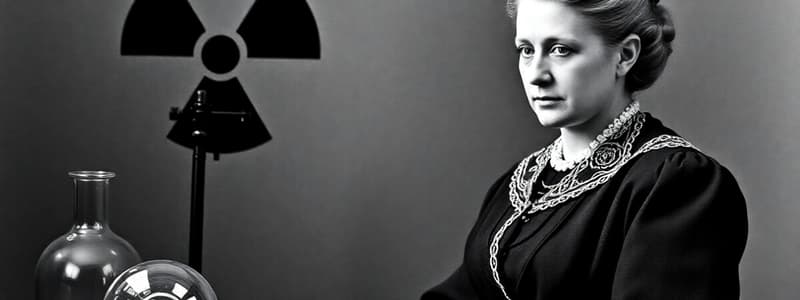Podcast
Questions and Answers
What new elements did Marie Curie discover alongside her husband?
What new elements did Marie Curie discover alongside her husband?
- Radon and Thallium
- Bismuth and Technetium
- Uranium and Lithium
- Polonium and Radium (correct)
Which field of study did Marie Curie help establish?
Which field of study did Marie Curie help establish?
- Nuclear Chemistry
- Thermodynamics
- Quantum Mechanics
- Atomic Physics (correct)
How did Pierre Curie contribute to Marie Curie's research?
How did Pierre Curie contribute to Marie Curie's research?
- He continued his own research while she worked.
- He independently discovered radium.
- He provided financial support for her studies.
- He joined her research after being fascinated by her work. (correct)
What was one major achievement of Marie Curie in 1911?
What was one major achievement of Marie Curie in 1911?
Which chemist collaborated with Marie Curie to isolate radium?
Which chemist collaborated with Marie Curie to isolate radium?
What distinguished the Nobel Prize awarded to the Curies and Henri Becquerel in 1903?
What distinguished the Nobel Prize awarded to the Curies and Henri Becquerel in 1903?
What societal challenge did Marie Curie face while trying to pursue her education in Poland?
What societal challenge did Marie Curie face while trying to pursue her education in Poland?
What discovery is associated with Henri Becquerel in 1896?
What discovery is associated with Henri Becquerel in 1896?
Which statement best describes the conclusion drawn by Rutherford from his gold foil experiment?
Which statement best describes the conclusion drawn by Rutherford from his gold foil experiment?
How did Bohr's view of electrons around the nucleus differ from classical physics?
How did Bohr's view of electrons around the nucleus differ from classical physics?
What was the significance of Rutherford's model of the atom in the context of scientific understanding at the time?
What was the significance of Rutherford's model of the atom in the context of scientific understanding at the time?
Which particle did Rutherford identify and name based on his findings about atomic structure?
Which particle did Rutherford identify and name based on his findings about atomic structure?
What concept did Bohr introduce to explain how electrons transition between energy levels?
What concept did Bohr introduce to explain how electrons transition between energy levels?
In what year did Rutherford publish his atomic model that was compared to a miniature solar system?
In what year did Rutherford publish his atomic model that was compared to a miniature solar system?
Which scientific community sentiment did Rutherford's atomic model challenge?
Which scientific community sentiment did Rutherford's atomic model challenge?
Who is credited with the final identification of the neutron, and in what year did this occur?
Who is credited with the final identification of the neutron, and in what year did this occur?
What significant discovery did Marie Curie make in 1910?
What significant discovery did Marie Curie make in 1910?
What was the name of the mobile X-ray units used during World War I?
What was the name of the mobile X-ray units used during World War I?
What type of radiation did Ernest Rutherford NOT identify?
What type of radiation did Ernest Rutherford NOT identify?
Which of the following correctly lists the particles that make up alpha radiation?
Which of the following correctly lists the particles that make up alpha radiation?
What health issue did Marie Curie ultimately succumb to due to her prolonged exposure to radiation?
What health issue did Marie Curie ultimately succumb to due to her prolonged exposure to radiation?
Which scientific principle did Rutherford's model of the atom introduce?
Which scientific principle did Rutherford's model of the atom introduce?
What significant scientific contribution did the Curies make regarding radioactive materials?
What significant scientific contribution did the Curies make regarding radioactive materials?
What eventually led to a change in scientists' approach to working with radioactive substances?
What eventually led to a change in scientists' approach to working with radioactive substances?
What did Curie establish in her efforts to advance cancer treatment research?
What did Curie establish in her efforts to advance cancer treatment research?
What did Rutherford use to transform nitrogen atoms into oxygen?
What did Rutherford use to transform nitrogen atoms into oxygen?
What was Marie Curie's perspective on her scientific discoveries?
What was Marie Curie's perspective on her scientific discoveries?
Which instability related to radioactive materials did Rutherford document?
Which instability related to radioactive materials did Rutherford document?
What tragedy struck Marie Curie in 1906?
What tragedy struck Marie Curie in 1906?
What did Ernest Rutherford reveal about the atom in his investigations?
What did Ernest Rutherford reveal about the atom in his investigations?
Flashcards are hidden until you start studying
Study Notes
Marie Curie
- A Polish scientist who made groundbreaking discoveries in the field of radioactivity
- Discovered polonium and radium in 1898 with her husband Pierre Curie
- Won the Nobel Prize in Physics with her husband and Henri Becquerel in 1903 for their work on radioactivity
- Won the Nobel Prize in Chemistry in 1911 for her work on isolating radium
- Founded the Curie Foundation, which pioneered cancer treatment using radium
- Advocated for using scientific knowledge for humanitarian purposes
- Died from radiation exposure
Henri Bequerel
- French physicist who discovered natural radioactivity in 1896
- Studied phosphorescence and its connection to X-rays
- Observed that uranium emits radiation, leading to the unit of radioactivity being named after him: the becquerel
Ernest Rutherford
- A New Zealand physicist who revolutionized our understanding of the atom and its structure
- Identified alpha and beta radiation in 1899
- Proposed the “Rutherford model” of the atom in 1911, which described a tiny positively charged nucleus orbited by electrons
- Discovered the proton in 1919
- Transmuted nitrogen into oxygen by bombarding it with alpha particles, demonstrating the process of nuclear fission
Niels Bohr
- Danish physicist who contributed to the understanding of atomic structure
- Proposed that electrons occupy fixed energy levels and orbit the nucleus in shells
- Utilized quantum physics to explain the limitations of classical physics in describing the Rutherford model
Key Concepts in Atomic Theory
- Radioactivity: The emission of energy from the nuclei of unstable atoms through the decay of particles such as alpha and beta radiation
- Atom: The smallest unit of an element, consisting of a nucleus containing protons and neutrons, surrounded by a cloud of electrons
- Atomic Nucleus: The dense, positively charged center of an atom containing protons and neutrons
- Proton: A positively charged subatomic particle found in the nucleus
- Neutron: A neutral subatomic particle found in the nucleus
- Electron: A negatively charged subatomic particle that orbits the nucleus
- Half-Life: The time it takes for half of a radioactive substance to decay
- Transmutation: The process of changing one element into another through nuclear reactions
- Quantum Physics: A theory describing the behavior of energy and matter at the atomic and subatomic levels
Studying That Suits You
Use AI to generate personalized quizzes and flashcards to suit your learning preferences.





